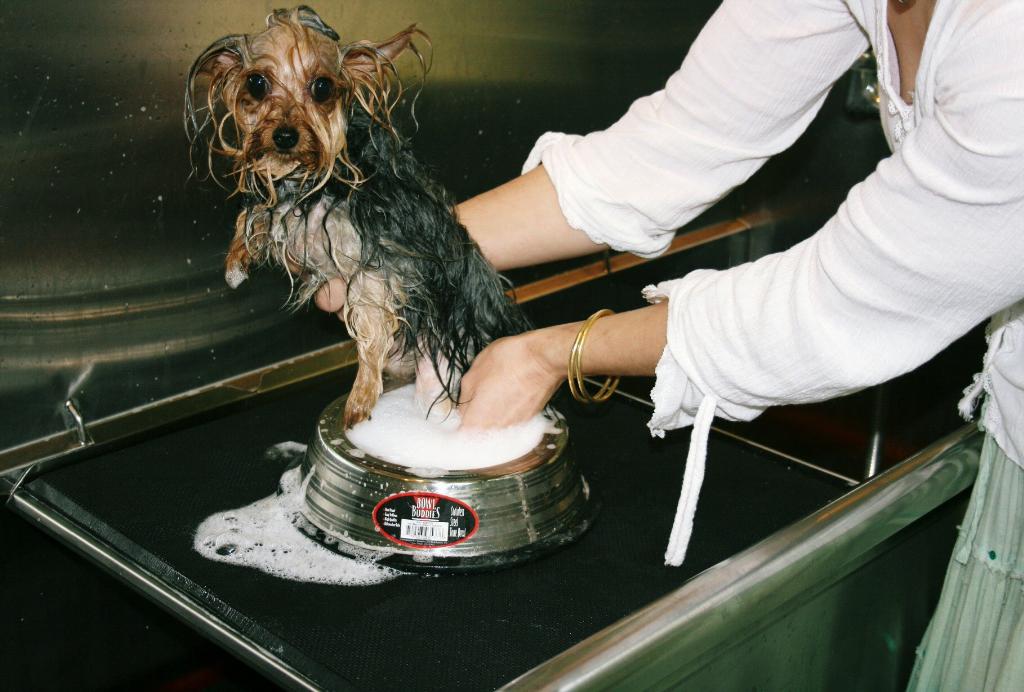Frequent licking of the paws can be a sign of contamination. Following these simple guidelines can help protect your dog’s tender paws.
Dr. Becker’s Comments:
Foot soaks are a great way to disinfect the paws of your dog. I recommend them not just for dogs that have itchy, inflamed, irritated paws, but also for dogs that are exposed to certain contaminants.
In the winter, a major contaminant is salt, which can be very irritating for dogs’ paws. Rinsing his paws off regularly is a great way to keep your pet’s feet decontaminated.
In the summer, on the other hand, it’s important to consider foot soaks because dogs are, of course, naked. They’re not wearing shoes and socks, and the only place your dog sweats (besides the nose), is from the bottom of his feet.
So, in essence, your dog’s feet are like wet Swiffers – they’re bare, they’re moist, and your dog is running through grasses, mud, streams, and leaves. All of these environments can expose your dog’s paws to microscopic allergens, as well as pesticides, herbicides, and other landscaping chemicals.
If you don’t remove these contaminants from their paws, they will usually start to lick them incessantly.
Homemade Foot Soaks For Your Pets
To remedy this obsessive licking, set up a foot soak. For small-breed dogs, you can set up a foot soaking station in your kitchen sink or laundry room drop sink.
At my house, I have a walk-in shower, so I just hose them off in there.
Other possibilities include putting a large plastic tub in your mud room or attached garage. Fill up the tub with water, then add iodine (found at most local pharmacies) until the water solution turns the color of iced tea. Some of my clients with giant breed dogs use a kid’s plastic swimming pool for foot baths, and some clients simply dunk their pets’ feet in a bowl….whatever works!
I recommend povidone iodine or Betadine® solution because it’s naturally antifungal, antiviral, safe, non-stinging, non-toxic, and non-abrasive. It’s a very effective disinfectant for your pet’s paws.
You can either have your dog simply walk through the tub a few times, or stand him in it for about 30 seconds. Then pat the paws dry with a towel.
Another option is to just cover his paws with pads soaked in the water and iodine solution. Keep them on for about two minutes, then remove and pat the paws dry. Research shows that soaking the paws is more effective than “dunking,” so either technique will be more effective than simply using a washcloth to remove contaminants.
Choosing a Foot Soak Solution Depends on the Condition of Your Pet’s Paws
There are also other gentle but effective solutions you can make depending on how irritated your dog’s paws are.
If your dog has cuts or wounds, or yeast (if your pet’s feet smell like corn chips), Betadine® is the very best solution.
If your pet’s paws are just irritated, consider adding chamomile tea bags to the soak water, which has natural soothing properties.
Half a cup of vinegar per gallon of water is another great topical disinfectant. I also use green tea, which provides healthy antioxidants to his skin. You can add tea bags or cooled tea to the foot soak water.
If your pet’s white feet have turned brown from excessive licking, rinsing paws with hydrogen peroxide with help remove the unsightly stains.
Clean Your Pet’s Paws Regularly
 It’s important to recognize that if your pet begins licking her paws, she’s telling you her paws are irritated. The best thing you can do is to NOT apply cream, salves or dips, but to keep the paws clean and dry. Although ointments may soothe the paws, they don’t do an adequate job of disinfecting, or removing contaminants. Ointments also increase the stickiness of the paws, attracting more contaminants, in many cases.
It’s important to recognize that if your pet begins licking her paws, she’s telling you her paws are irritated. The best thing you can do is to NOT apply cream, salves or dips, but to keep the paws clean and dry. Although ointments may soothe the paws, they don’t do an adequate job of disinfecting, or removing contaminants. Ointments also increase the stickiness of the paws, attracting more contaminants, in many cases.
By regularly disinfecting your pet’s paws, you’re reducing the chemical exposure to environmental toxins by rinsing those chemicals off, and you’re also providing a means to keeping your pet’s feet clean and dry, and free from allergens that can stimulate irritation and abrasion in her paws.
So, I highly recommend you try out one of these rinses. Oftentimes, just plain cool water will do the trick. Alternatively, making a cool tea mix and using it as a foot spritz in the summer is also a refreshing choice.
Credits
Written by: Dr. Karen Becker
Article Located Here: http://healthypets.mercola.com/sites/healthypets/
Other Popular Health Articles
Common Health Problems
Credits Here

